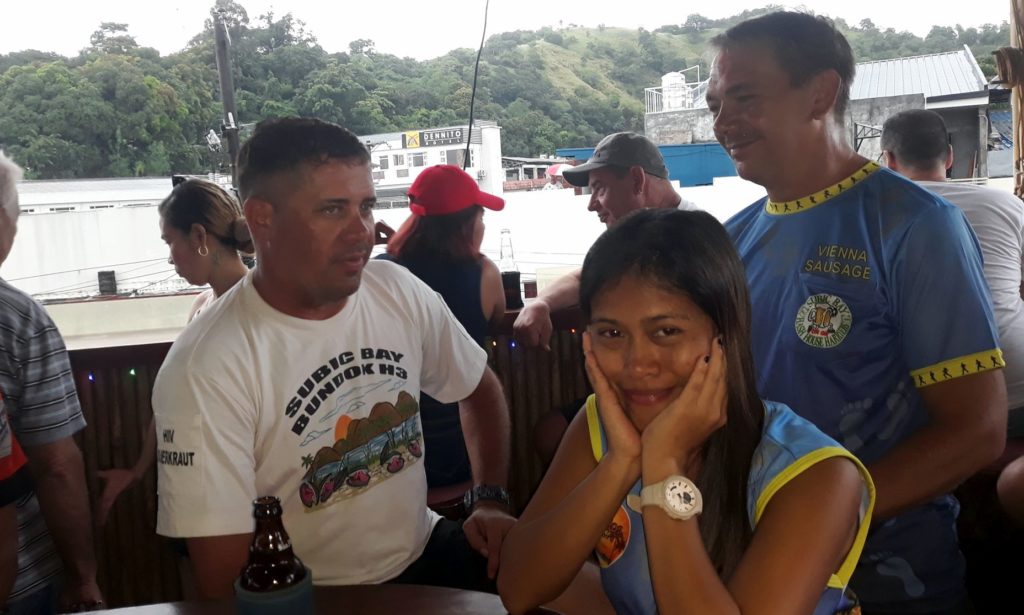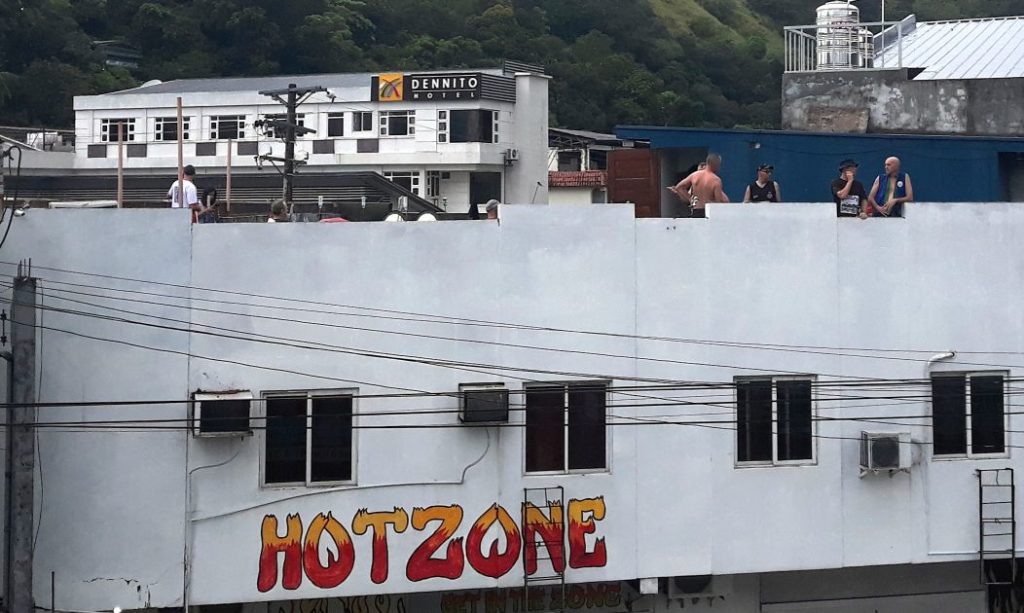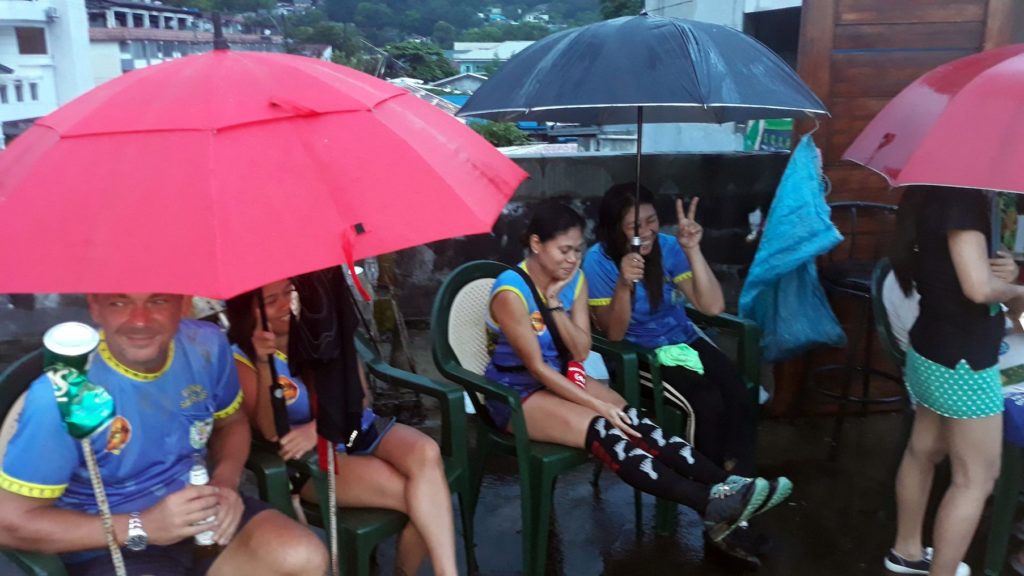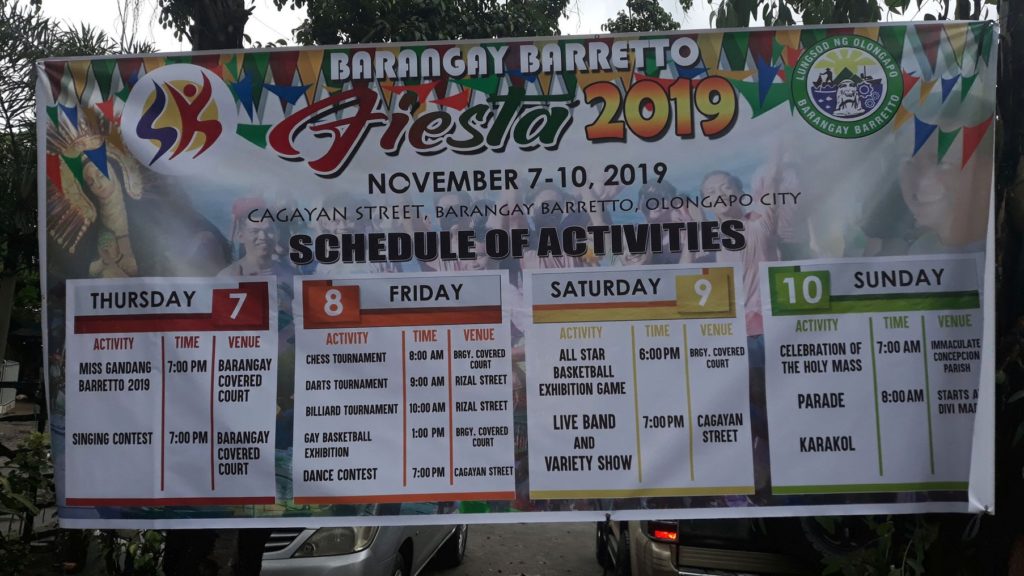It’s not like I’m washed up or anything, but yesterday’s Hash was a washout for me. Or more precisely, a rainout. The skies opened up around 3:00 and the rain continued periodically throughout the afternoon. Of course, the Hash goes on, rain or shine, but I just wasn’t feeling it. The Hare, Vienna Sausage, has a reputation for doing Alps-like climbs and I just wasn’t prepared to go there in the rain and the mud. I was not alone in that decision as probably only a third of 39 Hashers in attendance actually did the trail. I opted for a one hour hike on pavement and left it at that.

After I’d completed my own trail I popped into Cheap Charlies to await the beginning of the on-home activities across the street at Hot Zone.



Anyway, it wasn’t a great day for a Hash but we made the best of it. Still raining off and on today as well. I guess if all I’ve got to complain about is the weather things must be going pretty good, right?
Oh, I did come across some more Fiesta related information on my personal Hash trail yesterday. It’s a barangay-wide event as opposed to being city-wide, with events taking place in the various puroks around town. (A barangay is a village within the city, a purok is a neighborhood within the village).

Damn it! It’s pouring rain again, just when I was fixin’ to do my afternoon walk. Now what? Well, I came across this mildly interesting article today:
I talked to a Russian man who, during the 1980 Moscow Olympics, found himself working near the stadium box where Soviet leader Leonid Brezhnev was going to sit for the opening ceremony. He was standing by when Brezhnev’s security detail stormed in ahead of the General Secretary, and demanded to know what certain metal poles were doing in a particular place. Technicians explained that these were the supports for the TV lights that would illuminate Comrade Brezhnev.“We didn’t agree to these things!” one of the KGB men barked. “Get rid of them!”
You didn’t argue with the KGB. Down came the poles. And so, at the 1:25 mark in the opening ceremony (see above), when the camera lands on Brezhnev as he is introduced to the crowd, and to the watching world, the General Secretary is shrouded in darkness.
“That was the first clue I had that the system was going to fall,” said my Russian interlocutor. He meant that a system that caused a globally humiliating mistake like that to happen, because certain people in authority thought they knew better, and everybody below them was reasonably terrified to tell them no — a system like that was going to collapse.
I guess the reason I found it noteworthy was that it reminded me of one of the highlights of my government career. As usual, the Korean government was not wanting to pony up the amount of money the Americans thought necessary to pay for the US forces stationed in Korea. So, the USFK Commander (a four-star General) was frustrated and decided to pursue action that would send an appropriate message to the Koreans. I was invited because I was the civilian personnel director with oversight of our Korean workforce. So, the General’s big plan was to furlough our Korean workers. The room was packed with General Officers, Colonels and the like. They were all nodding their heads approvingly and saying “yes, sir!”. I’m sitting in the back of the room pretty much unnoticed. So I raised my hand and said: “excuse me, sir”. “Yes, what is it?” the General barked. I responded “I can do the union notification and issue the furlough letters. But I hope you understand this means we won’t have anyone to drive the school buses, clean the hospital, serve food in the mess hall…” The look on his face! He turned to the 2-star Marine General next to him and asked: “why wasn’t I informed of this?” Woo boy! Suffice to say we didn’t do the furlough and I got a lot of dirty looks from the yes men after that meeting.
Good times!

“Soon, we must all face the choice between what is right and what is easy.”
—Albus Dumbledore, “Harry Potter and the Goblet of Fire,” film version
Sometimes, you just gotta do what’s right.
Well, of course, we had contingency plans. Basically in the event of a strike by Korean employees, we’d have American soldiers assigned to those duties. Unfortunately, those plans were written when we had 45,000 troops stationed in Korea. Now we have around 28,000. Not enough bodies to do the work…
Or do you mean that I took the easy way out of the Hash yesterday? Ha Ha, yes, that too! It felt right at the time…